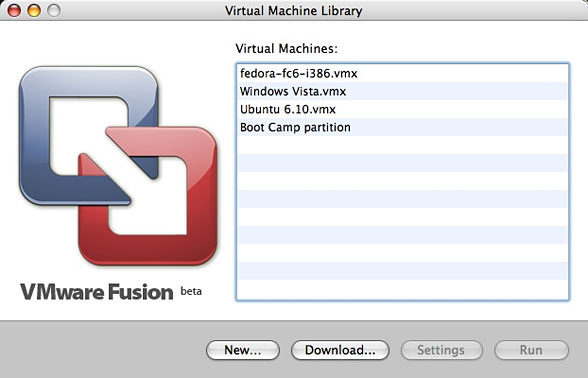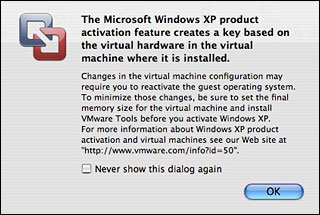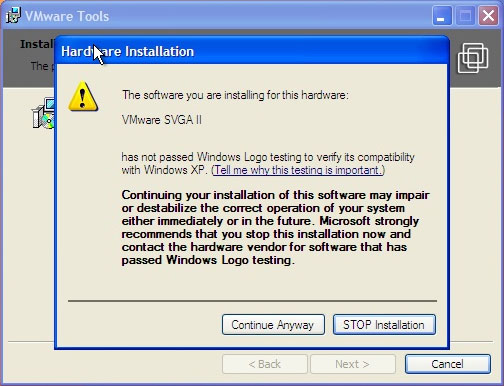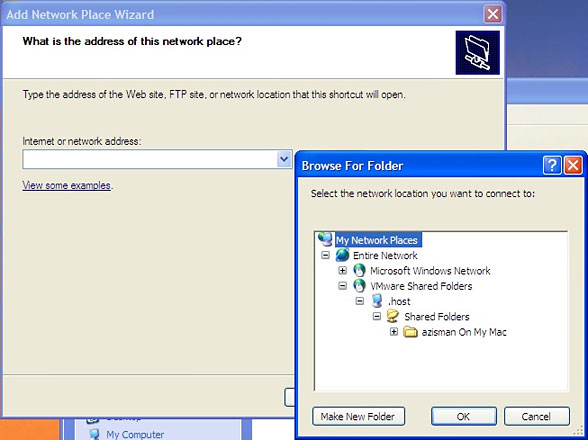Competition is a wonderful thing - the existence of the Mac OS
prods Microsoft into improving
Windows (and vice versa - yes, Mac fans, Apple has included
features that appeared first in Windows).
Mac users wanting to run virtualized sessions of Windows or
other PC operating systems are benefiting from the hot competition
between current Windows-on-Mac favourite Parallels Desktop
 and VMWare Fusion
(still in beta for Mac).
and VMWare Fusion
(still in beta for Mac).
In January, I noted the
emergence of VMWare Fusion, that company's first Mac
virtualization product, going head to head with the prerelease beta
of Parallels Desktop 2.0. Since that column, Parallels Desktop 2.0
has been officially released.
VMWare Fusion has not yet made it to official release, but the
company recently released Beta 3, with improved performance and new
features. It can be downloaded for free, and registration with
VMWare is required in order to get a needed serial number.
The user agreement for running Fusion Beta 3 "restricts formal
reviews of this beta product. This restriction will be lifted when
the product becomes generally available this summer." I've been
granted permission to write about this beta for Low End Mac at this
time as long as I restrain myself from commenting on performance
or comparing features to other products - these are reasonable
restrictions, since prerelease products have not yet been tuned for
performance and may be missing features (or including features)
compared to the eventual release versions - so no comparisons
between Fusion Beta 3 and Parallels Desktop in this article!
New to Beta 3: The ability to make use of an already-installed
copy of Windows XP in a Boot Camp partition, letting an existing
Windows installation do double-duty by allowing users to boot
directly to it or to run it as a virtualized session on top of Mac
OS X.
This is a neat trick: VMWare's software virtualizes video,
sound, and network adapters that don't exist on Macs, so it's
interesting that a single Windows installation can cope with these
changes. In fact, it copes surprisingly well. When starting up
Fusion for the first time, my existing Boot Camp partition was
listed in the "Virtual Machine Library", along with the virtual
machines I had created using the earlier beta version. It was not
necessary to create a new virtual machine to make use of this
feature.

It was, however, useful to click on the Settings button and
increase the amount of memory allocated up from the default 256 MB.
I opted for 512 MB, in my opinion the lowest reasonable amount for
Windows XP.

Also new in the settings is an option to Accelerate 3D graphics,
which VMWare notes is "currently experimental". I didn't test this,
but it could be a big step forward for Windows virtualizers, making
it possible to play Windows games with good performance without
having to boot directly into Windows using Boot Camp.
Fusion also includes an option to use two virtual processors and
offers USB 2.0 support and the ability to automatically connect new
USB devices. The user's Home folder can be set as a shared
partition, one route to moving files back and forth between the Mac
and Windows sessions.
 After checking the settings, I started up my existing Boot
Camp Windows XP installation running under Fusion. Fusion posted a
warning.
After checking the settings, I started up my existing Boot
Camp Windows XP installation running under Fusion. Fusion posted a
warning.
Windows XP and Vista make use of Microsoft's Product Activation
feature; they need to be activated in order to use them over
extended periods of time and to make use of Windows Update. And as
VMWare notes, making changes to the hardware setup can nullify
activation. Their suggestion: Make your changes, including
installing the VMWare Tools prior to activating.
Each time Fusion starts up, it repeats that activation warning -
at least until you check the option to stop showing it. It follows
it with a request for a password; I don't know why.
XP started without problem; sound, video, and networking all
worked even prior to installing the VMWare Tools. Nevertheless, I
installed the tools, which is an option in the Virtual Machine
menu. Doing so loads a CD image and installs replacement video,
network, and mouse drivers promising improved performance. The
Tools also make it easier to switch between the Windows and Mac
desktops and to drag and drop between them.
Note that Windows complains that these new drivers "have not
passed Windows Logo testing". This is the case with many (or most)
Windows drivers; ignore the warnings and proceed anyway.

As I noted in my earlier column, the Fusion window includes a
toolbar with large icons along the top; these icons, allowing users
to turn hardware such as CD-ROM, Sound Adapter, USB printer, etc.
on or off are potentially useful (though they duplicate functions
available from the menu bar). However, depending on your Windows
desktop size and the resolution of your Mac's monitor, this tool
bar may make the window too tall to display without scrolling.
The View menu includes the ability to turn off toolbar display.
(VMWare Tools display driver seems to use a default 1024 x 745
resolution that fits everything on screen and displays the toolbar
too . . . a handy thing since the option to turn off the
toolbar doesn't seem to stick between sessions).
Nicely, one of the features of the VMWare Tools install allows
dragging and dropping between the Mac and Windows desktops. Less
nice: The location of my shared Mac Home folder wasn't immediately
obvious. It didn't appear as a link on the Windows desktop or in My
Computer.
Firing up My Network Places didn't show it either, until I opted
to Add a New Network Place. There, in addition to the standard list
of Microsoft Windows Network shares was a new VMWare Shared Folders
item - drilling down, I was able to locate my Mac Home folder. It
works, but like many things in Windows, you need to know where to
look.

Okay, my Boot Camp partition's Windows XP installation worked as
a virtual session; the next question was whether it would continue
to allow me to boot to Windows. Remember, in order to work
properly, it would need to use the correct video, sound, and
network drivers for the hardware actually installed on my iMac.
(Normally, my Mac has an icon for my Boot Camp Windows partition
on my desktop; when Fusion is making use of that partition, the
icon disappears. When quitting Fusion, it takes a moment or two for
the drive to mount again. Until that happens, the Windows partition
is not listed in the Startup Disk system preference).
Shutting everything down, I rebooted my Mac, this time choosing
to boot to the Windows partition. (A reminder to Boot Camp users:
pressing the option/alt key when you hear the boot chime lets you
manually choose to boot to Mac OS X or Windows, a handy trick
if you've haven't used the Startup Disk preference or if [as in my
case] the Windows partition hadn't been remounted on the Mac
desktop.)
And again, everything worked. Without apparently spending time
discovering new hardware, the Boot Camp installation started up
with the correct video, network, and sound drivers in operation.
This is immediately noticeable: in Boot Camp, I have Windows set to
use my 17" iMac display's full 1440 x 900 pixels; running in a
Fusion window on my Mac desktop, I prefer to set the display at
1024 x 768 (or, in this case, 745) pixels. I can move from one to
the other without needing to manually fiddle with display settings.
Nice.
For me, the ability to make use of a Boot Camp installation of
Windows XP is an important addition to Fusion; as a result, I no
longer need two XP installations - one for Boot Camp, the other to
run in a virtual session while running OS X.
But that's not the only thing new to Fusion Beta 3; many users
will find the new Snapshot feature especially useful. This lets
users capture a "snapshot" of the current state of their Windows
machine. Later, if a software or driver install (or virus or
spyware) makes the system unusable, they can revert back to the
snapshot. (They will, however, lose any work saved since making the
snapshot. Note that this option is not available when running a
Boot Camp installation.)
As with the previous betas - and unlike Parallels - Fusion Beta
3 supports 64-bit operation, allowing extra performance from the
Mac's CPU(s) and allowing users to make use of 64-bit PC operating
system versions. The new beta offers users the option to turn off
debugging features for increased performance.
Also new in Beta 3: a Windows Easy Install feature makes
creation of a new Windows virtual session quick and easy.
VMWare has yet to announce pricing for Fusion; I don't know
whether they will match the pricing of VMWare Workstation for
Windows and Linux (US$200), match the free availability of
Microsoft's Virtual PC for Windows or VMWare's free Server or
Player versions for Windows and Linux, or set some other price
point. (Fusion's beta version is freely available for now).
VMWare Fusion Beta 3 is a big improvement over the previous
prerelease version. I'm looking forward to this summer's release.




 After checking the settings, I started up my existing Boot
Camp Windows XP installation running under Fusion. Fusion posted a
warning.
After checking the settings, I started up my existing Boot
Camp Windows XP installation running under Fusion. Fusion posted a
warning.


